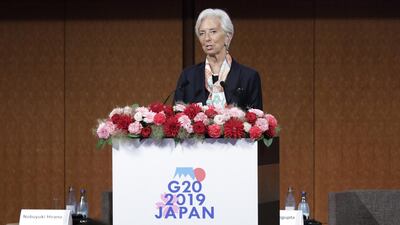The International Monetary Fund head called on countries to resolve trade tensions to reduce risks to the global economy, which could shave off 0.5 per cent in growth or about $445 billion (Dh1.63 trillion) in 2020.
“The principal threat stems from continuing trade tensions,” IMF managing director Christine Lagarde said at the end of the G20 meeting of finance ministers and central bank governors in Japan on Sunday.
“The first priority should be to resolve the current trade tensions – including eliminating existing tariffs and avoiding new ones – while we need to continue to work toward the modernisation of the international trade system,” Ms Lagarde said. “This would be the best way for policymakers to give more certainty and confidence to their economies and to help, not hinder, global growth.”
In April, the Washington-based lender cut the global economic growth forecast amid softness in many parts of the world. However, recent data releases suggest that growth may have strengthened in the first quarter of 2019, suggesting an acceleration to 3.6 per cent in 2020 from 3.3 per cent in 2019. However, questions remain about the strength of the recovery, as trade tensions could persist or further escalate, and the UK's divorce from the European Union might end up being disorderly, the IMF said.
“We met at a time when the global economy is showing tentative signs of stabilising and growth is projected to strengthen. While this is good news, the road ahead remains precarious and subject to several downside risks,” Ms Lagarde said.
The US-China trade war initiated by President Donald Trump, remains the biggest threat to global economy. It has dented profitability in industries such as aviation, disrupted global supply chains, damaged investor sentiment and has roiled markets during the course of past two years. Talks between Beijing and Washington to resolve the dispute have stalled, leaving in place tariffs on $360bn worth of goods between the two top world economies.
The IMF, along with the World Bank and the World Trade Organisation, has in the past voiced concerns over an escalating tariff war, but it doesn't see the threat of a global recession as a result of the dispute. It has however, lowered China's growth forecast to 6.2 per cent in 2019 and 6 per cent in 2020, down from earlier forecasts of 6.3 per cent and 6.1 per cent, respectively.
Besides tariffs, the lender sees rising debt levels in many advanced economies and emerging markets driven by lower interest rates as the other major threat that could derail economic recovery next year. All of these factors have come into play at a time when "monetary and fiscal policy space is more limited than in the past".
The IMF recommends that fiscal policy around the world should carefully balance growth, debt and social objectives. Structural reforms from opening up markets to encouraging greater participation by women in the workforce should be used to lay the foundation for stronger and more inclusive growth.
If measures such as these are implemented jointly, the IMF estimates they could boost the combined GDP level of G20 countries by 4 per cent over the long term.
“Of course, determined joint action is also needed in many other areas: in international tax, in the financial sector, to ensure an open and resilient system grounded in agreed international standards and in the area of debt, particularly for low-income countries,” Ms Lagarde said.


